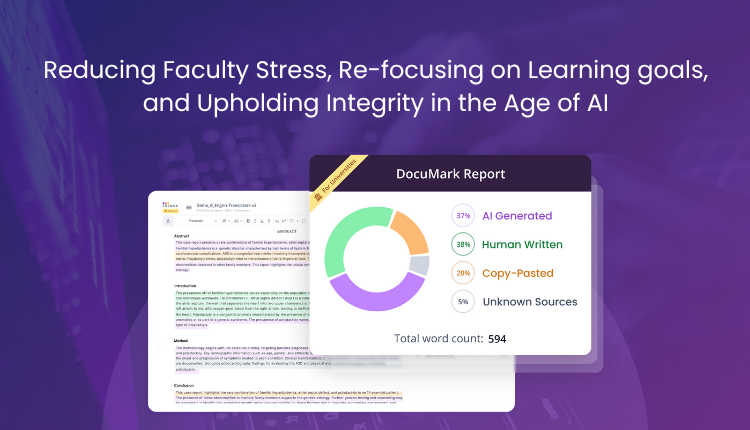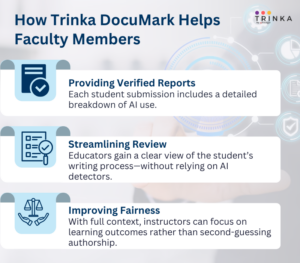Reducing Faculty Stress, Re-focusing on Learning goals, and Upholding Academic Integrity in the Age of AI

The rise of artificial intelligence (AI) has dramatically changed how students write. From drafting with tools like ChatGPT and Copilot to receiving feedback through AI-powered editors, technology has become a core part of the learning process. While this boosts productivity, it also raises concerns about academic integrity, transparency, and increased faculty workload.
Trinka’s DocuMark directly addresses these challenges—not by detecting AI use, but by encouraging ethical engagement, learning, and student accountability. It helps educators support responsible AI usage while minimizing the need for manual verification.
Why Transparency Matters More Than Ever
In a survey of 1,000 U.S. college students, 56% admitted to using AI for assignments or exams. Over half saw this as cheating or plagiarism, while 25% were unsure, and 21% felt it was acceptable.
These conflicting views create confusion and stress for both faculty and students. Educators often lack visibility into how AI tools are used—some students might use them appropriately for brainstorming or grammar checks, while others use them to generate entire submissions.
Without a clear system for disclosure, instructors struggle to differentiate between genuine effort and misuse.
Meet DocuMark – A Smarter Way to Handle AI Use in Academia
Unlike traditional detection software, DocuMark is a transparency and verification platform that empowers students to engage ethically with AI. It walks them through a clear process of disclosure, review, and reflection—without fear of punishment.
How it supports students:
- Responsibility: Encourages active participation and accountability in the writing process.
- Self-Verification: Promotes editing and compliance with institutional standards.
- Fair Evaluation: Provides educators with a clear, student-led view of how work was created.
This thoughtful approach builds trust and promotes intentional learning.
Easing Faculty Workload
Teachers worldwide are overwhelmed by the growing need to validate student authorship, often without proper tools or policies in place.
DocuMark relieves this burden by offering full visibility into how AI was used—through verified, student-submitted reports. Educators no longer have to rely on guesswork or time-consuming investigations. Instead, they can make informed, fair decisions based on documented student input.

This allows instructors to return to what they do best: mentoring and teaching.
Promoting Integrity Without Punishment
As AI becomes standard in academic workflows, institutions are struggling to adapt. Some have robust AI-use policies, others have none—leaving students and teachers uncertain.
DocuMark brings consistency and structure by:
- Reflecting institutional guidelines through customizable configurations.
- Providing documentation for resolving potential misconduct cases.
- Encouraging ethical checkpoints during the writing process—not after submission.
This shift from punishment to guidance supports a more balanced and future-ready academic culture.
A Future-Forward Tool for Ethical AI Use
As AI becomes integrated into more educational platforms, academic integrity frameworks must evolve. Tools that only react won’t be enough—scalable, proactive solutions are essential.
DocuMark isn’t just about compliance—it’s a pedagogical framework grounded in ethical learning design. It helps educators and students use AI responsibly, with clarity and purpose.
With its unique approach, DocuMark can:
- Fosters ethical awareness through guided learning steps.
- Supports discipline-specific writing standards.
- Increases transparency in online and blended classrooms.
Institutions that adopt DocuMark are choosing to embrace technology with responsibility and integrity.
In Conclusion
AI is now a permanent part of education. Instead of resisting it, schools must reshape their approach to teaching and evaluation.
DocuMark by Trinka makes that transition smoother—by promoting transparency, easing educator stress, and focusing on learning outcomes. It empowers students to take ownership of their work and gives teachers the tools to assess fairly and confidently.
Want to see it in action?
Book a demo today and discover how DocuMark can turn AI use into a meaningful learning opportunity.




